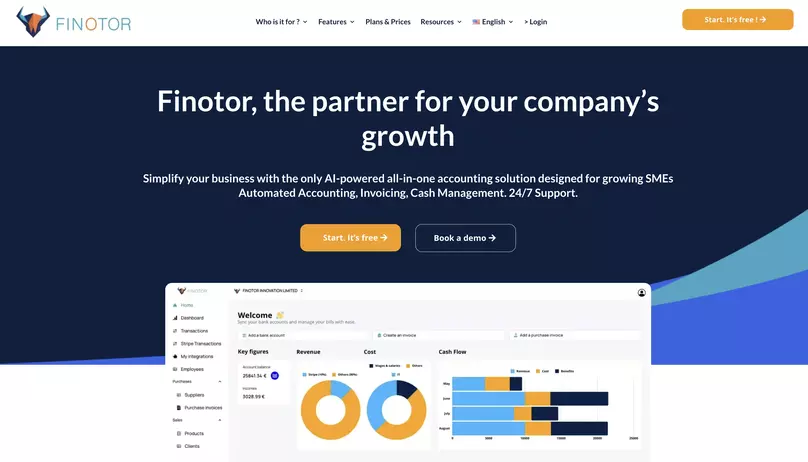Master Your Finances with These Bookkeeping Essentials for Entrepreneurs
Introduction
Are you a small business owner or entrepreneur looking to establish a strong financial foundation for your venture? Look no further! Bookkeeping is the backbone of any successful business, and mastering bookkeeping basics, including managing bills, can lead to better decision-making, streamlined operations, and long-term growth. This comprehensive guide will take you through the essentials of setting up your bookkeeping system, ensuring you have all the tools and knowledge needed to keep your finances in check.
From understanding the basics to implementing advanced strategies, we’ve got you covered. By the end of this post, you’ll be equipped with practical tips, relevant examples, and a clear roadmap to creating an efficient bookkeeping system tailored to your business needs, bringing your business to life like successful entrepreneurs do.
Understanding Bookkeeping Basics
What is Bookkeeping?
Bookkeeping involves the systematic recording, organizing, and tracking of financial transactions to ensure the financial health of your business. It ensures that all financial activities are accurately documented, providing a clear picture of your business’s financial health.
By maintaining accurate records, you can make informed decisions, identify trends, and stay compliant with tax regulations. Bookkeeping also helps in preparing financial statements, such as income statements and balance sheets, which are crucial for assessing your business’s performance and attracting potential investors.
Importance of Bookkeeping for Small Businesses
Financial health is essential for small businesses as it helps in managing cash flow, planning budgets, and tracking expenses. Accurate records enable you to identify profitable areas and potential cost-saving opportunities.
Furthermore, well-maintained books build credibility with investors and lenders, making it easier to secure funding. They also simplify the tax filing process, reducing the risk of errors and penalties.
Common Bookkeeping Terms to Know
Familiarizing yourself with bookkeeping terminology is vital for effective record-keeping. Some common terms include:
- Assets: Resources owned by the business (e.g., cash, inventory, equipment).
- Liabilities: Obligations or debts owed by the business (e.g., loans, accounts payable).
- Equity: Owner’s claim on the business assets after liabilities are settled.
- Revenue: Income generated from business operations (e.g., sales, services).
- Expenses: Costs incurred in running the business (e.g., rent, utilities, salaries).
Choosing the Right Bookkeeping Method
Single-Entry vs. Double-Entry Bookkeeping
There are two primary bookkeeping methods: single-entry and double-entry. Single-entry bookkeeping is simple and suitable for small businesses with minimal transactions. It involves recording each transaction once, either as an income or expense, providing a straightforward way to manage business finances and breathe life into your financial tracking.
In contrast, double-entry bookkeeping is more complex but provides a comprehensive view of your finances. Each transaction is recorded twice, as a debit and a credit, ensuring accuracy and minimizing errors. This method is ideal for growing businesses with increasing financial activities, a growing number of employees, expanding services, and companies looking to accurately track their revenue and cost of goods sold. Double-entry bookkeeping is often favored by the successful entrepreneur aiming for precise financial management.
Cash Basis vs. Accrual Basis Accounting
When setting up your bookkeeping system, you must choose between cash basis and accrual basis accounting. Understanding bookkeeping basics, such as the difference between these methods, is crucial. Cash basis accounting records transactions when cash is received or paid, making the bookkeeping process straightforward and suitable for businesses with simple financial structures. Accrual basis accounting, on the other hand, records transactions when they are earned or incurred, regardless of cash flow, providing a more accurate financial picture of your revenue and expenses, and is preferred by larger businesses or companies with complex transactions. Additionally, the accrual method can offer advantages in timing for recognizing income and expenses, which can impact tax deductions and the overall management of money. For very small businesses or those just starting out, the single-entry system can also be an option, as it records each transaction only once, either as an income or an expense, providing simplicity but less detail compared to double-entry accounting.
Selecting Bookkeeping Software
Investing in reliable bookkeeping software can streamline your financial processes and reduce manual errors. Popular options include QuickBooks, Xero, and FreshBooks. These platforms offer features such as invoicing, expense tracking, bill management, and financial reporting.
Choose software that aligns with your business needs, budget, and technical expertise. Many solutions offer free trials, allowing you to test their functionality before committing. Efficient bookkeeping software helps ensure timely pay of bills and salaries, enhancing overall financial management. Additionally, accurate financial tracking and reporting can significantly boost your profit by identifying cost-saving opportunities and optimizing resources, which can help when looking to raise money from investors or lenders. Furthermore, these tools can improve customer management by integrating invoicing and payment processes, ensuring a seamless experience for your customers.
Setting Up Your Chart of Accounts
A chart of accounts (COA) is a list of all financial accounts used by your business, categorizing transactions into different accounts such as assets, liabilities, equity, revenue, and expenses. The COA serves as the backbone of your bookkeeping system, ensuring consistency and organization in your financial records and simplifying the process of generating financial reports and analyzing your business’s performance. To create a customized COA, start by listing all relevant accounts specific to your business and group them into categories like assets (cash, accounts receivable, inventory, equipment), liabilities (accounts payable, loans, accrued expenses), equity (owner’s equity, retained earnings), revenue (sales income, service income, interest income), and expenses (rent, utilities, salaries, office supplies). Ensure your COA is detailed enough to capture all financial activities but not overly complex to maintain. Regularly review and update your COA to reflect changes in business operations, adding new accounts as needed and deactivating those that are no longer relevant. Consistently recording all transactions under the appropriate accounts, along with the total amount, will help maintain the accuracy and reliability of your financial records and provide the necessary details for an accurate balance sheet.
Recording Financial Transactions
Accurate transaction recording is crucial for maintaining the integrity of your financial data, especially in a small business, as it ensures that your books are up-to-date and provides a clear view of your business’s financial position and overall business finances. Inaccurate or incomplete records can lead to errors in financial reporting, tax filing, and decision-making, making it essential to establish a consistent process for recording transactions. The steps for recording transactions include collecting source documents such as invoices, receipts, and bank statements; identifying which accounts are affected by the transaction (e.g., cash, sales income, accounts payable); recording the transaction details into your accounting software or ledger accurately and completely; and regularly verifying and reconciling your records with bank statements to identify and correct discrepancies. To stay organized, establish a routine for recording transactions by setting aside specific times each week to update your books and review your financial data, use digital tools and apps to scan and store receipts and invoices to reduce the risk of lost documents, and maintain a consistent naming convention for files and folders to simplify retrieval.
Managing Accounts Receivable and Payable
Understanding accounts receivable (AR) and accounts payable (AP) is crucial for efficient financial management. AR represents money owed to your company by customers for goods or services provided on credit, and efficient AR management ensures timely collection of payments, improving cash flow and reducing bad debts. Best practices for managing AR include setting clear payment terms, sending invoices promptly, and following up on overdue payments systematically. To create an effective AR system, ensure your company has a robust invoicing and follow-up process in place. AP represents money owed by your company to suppliers for goods or services received on credit, and efficient AP management ensures timely pay of these obligations, maintaining good supplier relationships and avoiding late fees. Best practices for managing AP include organizing and tracking invoices by due date, scheduling payments timely (possibly using automated payment systems), and negotiating favorable payment terms with suppliers to improve cash flow and manage working capital effectively. To create an efficient AP system, implement a reliable tracking and scheduling mechanism for all payables to ensure your company has the necessary money available when payments are due. Additionally, regularly reconciling your company’s AP and AR accounts will help maintain accurate financial records.
Reconciling Bank Statements
Financial records reconciliation is the process of comparing your bookkeeping records with your bank statements to ensure consistency and accuracy. Regular reconciliation, often facilitated by accounting software, helps identify discrepancies, errors, and unauthorized transactions. The steps for bank reconciliation include gathering statements for the reconciliation period, comparing each transaction in your bookkeeping records with those on your bank statement, identifying discrepancies such as missing transactions, duplicate entries, or errors, and making necessary adjustments to your bookkeeping records to resolve these discrepancies. Regular bank reconciliation provides several benefits, including ensuring that your financial records accurately reflect your business’s financial position, helping to identify unauthorized transactions and potential fraud, and providing a clear view of available funds, which aids in effective cash flow management, ensures timely payment to employees, and allows for strategic planning of future investments and revenue growth. Additionally, reconciling all the income and cost of goods sold recorded in your books with the bank statements, and verifying your journal entries, ensures completeness and accuracy in your financial reporting.
Preparing Financial Statements
Key financial statements provide a summary of your company’s financial activities and position, including the Income Statement (showing revenue, expenses, and profit or loss over a specific period), Balance Sheet (providing a snapshot of assets, liabilities, and equity at a specific point in time), and Cash Flow Statement (tracking the flow of cash in and out of the business over a period). Steps for preparing financial statements involve gathering all relevant financial data (income, expenses, assets, liabilities), organizing the data into appropriate categories, and using bookkeeping software or templates to prepare accurate and complete financial statements. Analyzing these financial statements helps you understand your business’s performance and make informed decisions by assessing key metrics such as profit margins (comparing revenue to expenses), liquidity ratios (measuring the ability to meet short-term obligations), and debt ratios (evaluating the level of debt relative to equity and assets), thereby enhancing your financial leadership and strategic planning abilities. This is especially important for sole proprietors, as clear and accurate financial statements help in maintaining personal and business financial separation and support informed decision-making within your company.
Budgeting and Forecasting
Budgeting involves creating a financial plan that outlines expected income and expenses, helping you allocate resources effectively, control costs, and achieve financial goals. The steps for creating a budget include setting objectives by defining your financial goals, estimating income based on historical data and market trends, identifying and categorizing all anticipated expenses, and regularly reviewing and adjusting the budget to stay on track. Forecasting, which involves predicting future financial outcomes based on historical data and market trends, complements budgeting by helping you anticipate challenges, plan for growth, and deal with any potential financial setbacks, allowing you to make strategic decisions. Additionally, regularly updating your balance sheet ensures that your budgeting and forecasting efforts accurately reflect your current financial position, and separating business finances from your personal account helps maintain clear and accurate financial records. Properly managing money within your budgeting process is essential for maintaining financial stability and achieving your financial goals, especially for entrepreneurs looking to build and sustain successful businesses.
Implementing Internal Controls
Internal controls are policies and procedures designed to safeguard assets, ensure accurate financial reporting, and promote operational efficiency, helping to prevent errors, fraud, and non-compliance with regulations and taxes. Key internal controls include segregation of duties, which involves dividing responsibilities among different individuals to reduce the risk of errors and fraud; authorization procedures, which establish approval processes for financial transactions to ensure they are legitimate and accurate; and regular audits, both internal and external, to verify the accuracy of financial records and compliance with policies. Having a skilled bookkeeper can be crucial in implementing and maintaining these internal controls effectively. Strong internal controls provide several benefits for your company, including reducing the risk of fraud and theft by implementing checks and balances, ensuring the accuracy and reliability of financial records, and maintaining compliance with regulatory requirements and industry standards.
Staying Compliant with Tax Regulations
Understanding tax obligations is crucial for small businesses to comply with various requirements, including income tax, sales tax, payroll tax, and more, to avoid penalties and ensure timely payments, maintaining financial stability and good standing with tax authorities. Steps for staying compliant include registering for necessary tax identification numbers, maintaining accurate records of all financial transactions, and ensuring timely filing and payment of all required taxes. Staying compliant with tax regulations provides several benefits, such as avoiding costly penalties and interest charges for late or inaccurate filings, building credibility by establishing a reputation for reliability and trustworthiness with tax authorities and stakeholders, maintaining financial stability by avoiding unexpected tax liabilities, and safeguarding your job as a responsible business owner. Entrepreneurs, in particular, need to be vigilant about these obligations to ensure the growth and sustainability of their ventures and to manage their money effectively.
Engaging Professional Help
While many small business owners can manage basic bookkeeping tasks, there are times when professional help in financial management is beneficial. Consider hiring a bookkeeper, accountant, or financial advisor if your company has complex financial transactions or multiple revenue streams, you lack the time or expertise to manage bookkeeping effectively, or your business is experiencing rapid growth and requires advanced financial management. Entrepreneurs can particularly benefit from hiring a professional bookkeeper, gaining access to specialized knowledge and expertise in financial management, improved accuracy and reliability of financial records, and guidance on strategic financial decisions and tax planning. Additionally, having a professional manage your company’s account ensures that all financial activities are accurately recorded and compliant with regulations.
Leveraging Technology for Bookkeeping
Financial insights are one of the numerous benefits offered by bookkeeping software, including automation to streamline repetitive tasks and reduce manual errors, real-time insights for informed decision-making, and integration with other business tools such as invoicing, payroll, and inventory management, making it easier to manage your own business finances and maximize profit. Popular bookkeeping software options include QuickBooks, Xero, and FreshBooks, each offering unique features and pricing plans to suit different business needs. When selecting bookkeeping software, consider factors such as ease of use to ensure the platform aligns with your technical expertise, the features offered such as invoicing, expense tracking, and financial reporting, and reliable customer support and resources. Additionally, having a bookkeeper to oversee the use of the software can further enhance accuracy and efficiency in managing your finances.
Frequently Asked Questions (FAQs)
1. What is the difference between bookkeeping and accounting?
Bookkeeping involves recording daily financial transactions, while accounting is the process of analyzing, interpreting, and summarizing financial data to provide insights and generate reports.
2. Why is it important to forecast financial outcomes?
Forecasting helps anticipate future challenges, plan for growth, and make informed strategic decisions. It ensures that your business stays on track and can adapt to market trends.
3. What are some examples of internal controls?
Internal controls include segregation of duties, authorization procedures for transactions, regular audits, and maintaining accurate financial records.
4. How do internal controls prevent fraud?
Internal controls such as segregation of duties and authorization procedures implement checks and balances, reducing the risk of errors and fraud by ensuring no single individual has control over all aspects of financial transactions.
5. What tax obligations do small businesses need to be aware of?
Small businesses must comply with various tax obligations including income tax, sales tax, and payroll tax. Understanding these obligations helps avoid penalties and maintain compliance with tax authorities.
6. When should I consider hiring a professional accountant or bookkeeper?
Consider hiring a professional if your business has complex financial transactions, if you lack the time or expertise to manage bookkeeping, or if your business is experiencing rapid growth needing advanced financial management.
7. What are the benefits of using bookkeeping software?
Bookkeeping software can automate repetitive tasks, provide real-time financial insights, reduce manual errors, and integrate with other business tools like payroll and inventory management systems.
8. How do I choose the right bookkeeping software?
When choosing bookkeeping software, consider factors like ease of use, the necessary features such as invoicing and expense tracking, and the availability of customer support and resources.
9. What should I do to stay compliant with tax regulations?
To stay compliant, register for tax IDs, keep accurate financial records, and ensure timely filing and payment of all required taxes. This prevents costly penalties and helps maintain good standing with tax authorities.
10. Why is setting up an efficient bookkeeping system vital for small businesses?
An efficient bookkeeping system ensures accurate financial records, supports informed decision-making, drives business success, and is essential for compliance. It also serves as a powerful tool for growth and sustainability.









